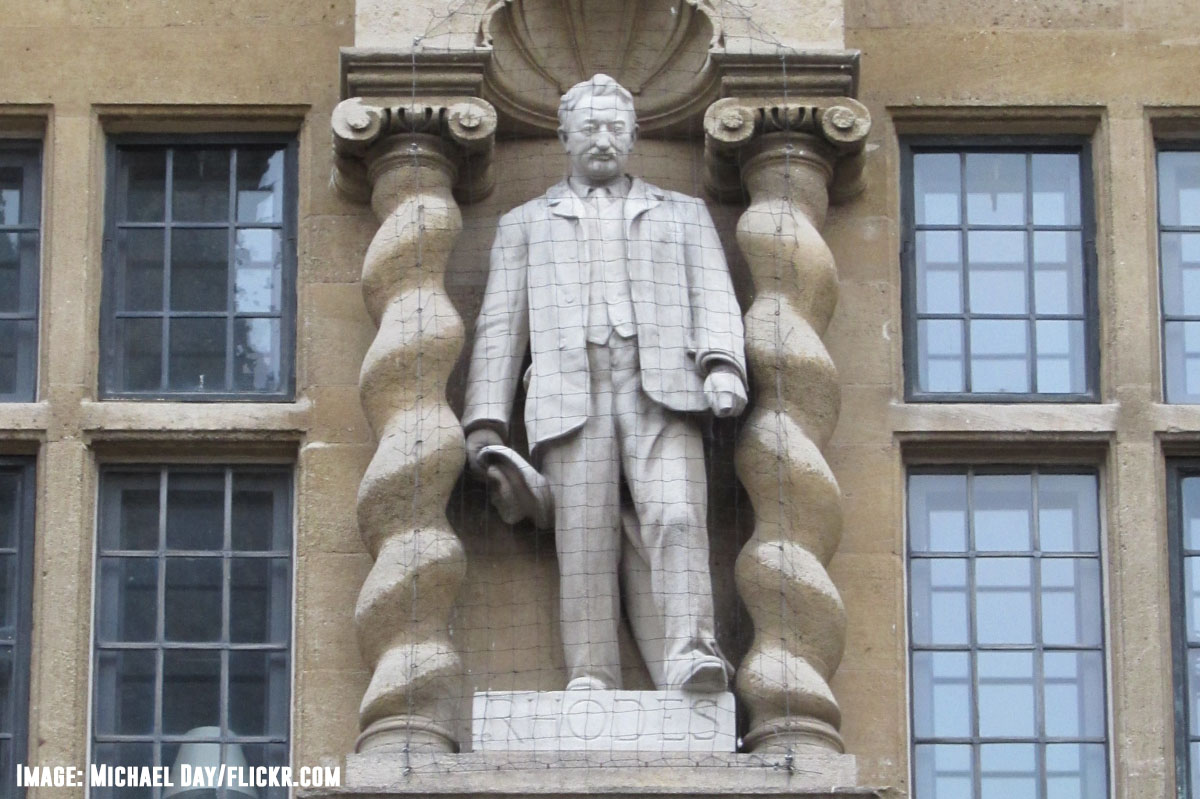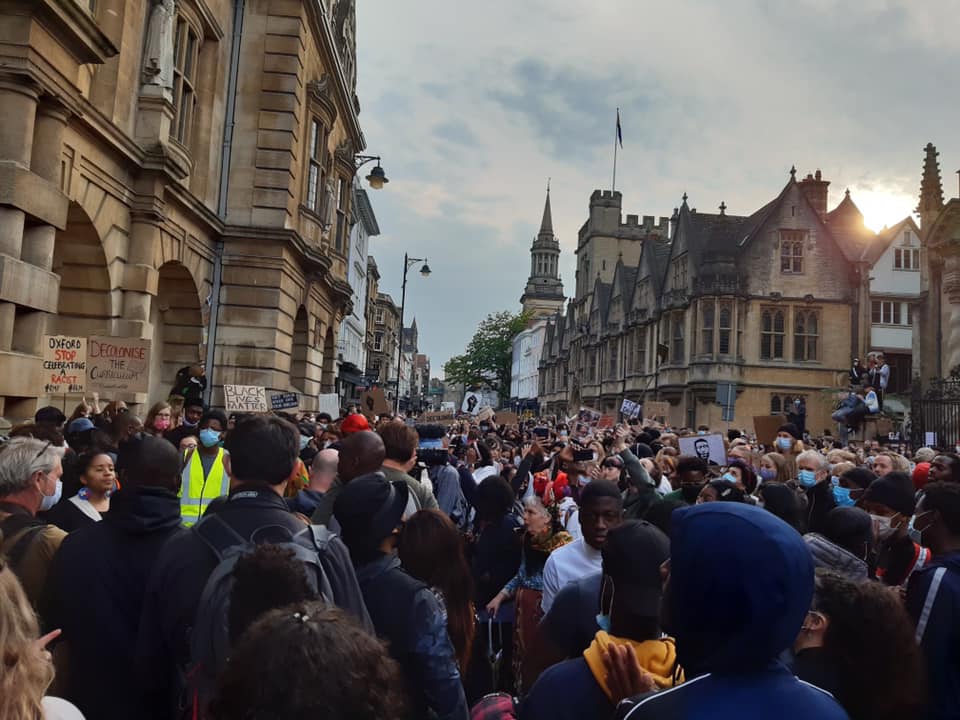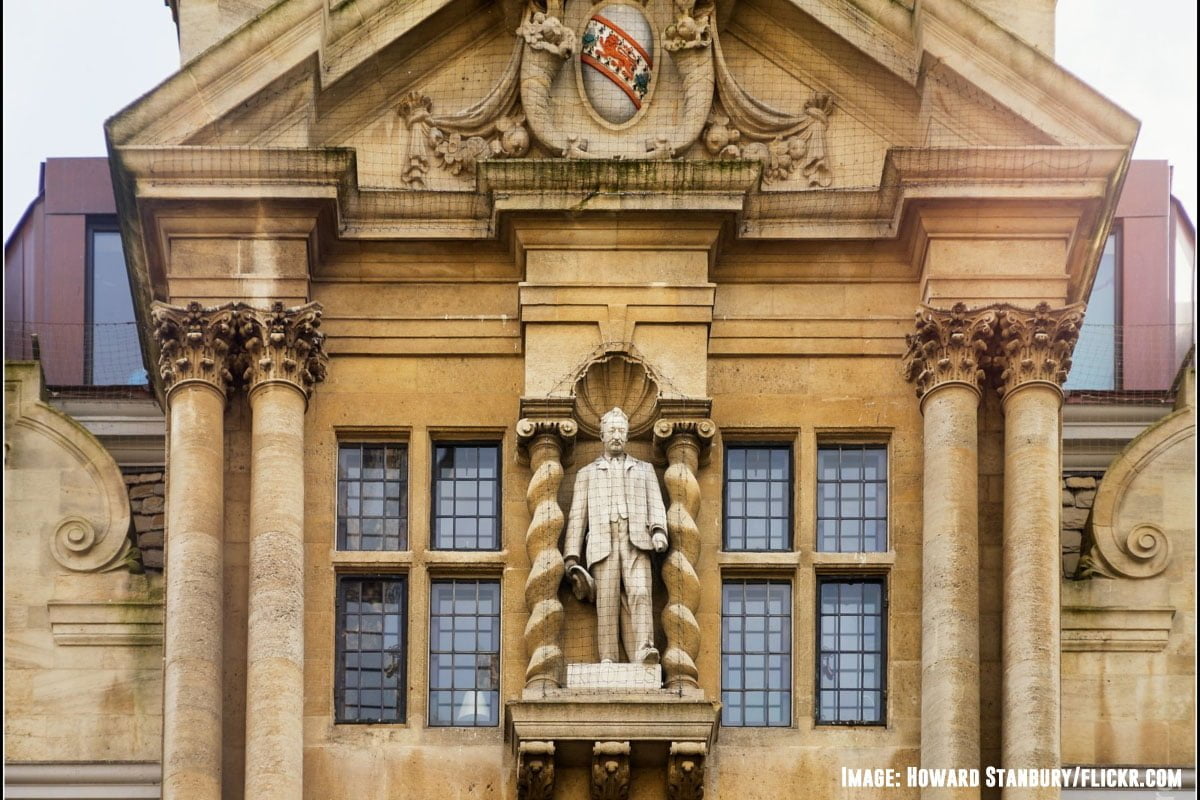The Black Lives Matter movement has reignited the Rhodes Must Fall campaign in Oxford, which aims to challenge the university’s racism and colonial legacy. We need mass action to tear down these statues – and tear down capitalism.
Earlier this month, on 9 June, over a thousand people gathered outside Oxford University’s Oriel College to demand the removal of the Rhodes statue, reviving the ‘Rhodes Must Fall’ campaign in Oxford.
Cecil Rhodes was a British imperialist. He has been described as the ‘architect of apartheid’ in South Africa, due to his leading role in the colonial regime – in particular through altering land ownership, and bringing in laws to displace and disenfranchise black people.
He was also a student at the University of Oxford. When he died in 1902, a large sum of his wealth – much of which he amassed running diamond mines on slave labour – was donated to the university. To thank him for this ‘great generosity’, a statue of Rhodes was placed on the front of Oriel College, overlooking Oxford’s High Street.
Colonial monument
 This memorial to colonialism remained unchallenged until 2015, when a wave of protests across university campuses in South Africa called for the removal of similar statues of Rhodes. An allied movement soon emerged at Oxford University.
This memorial to colonialism remained unchallenged until 2015, when a wave of protests across university campuses in South Africa called for the removal of similar statues of Rhodes. An allied movement soon emerged at Oxford University.
The Rhodes Must Fall campaign calls for the removal of the Rhodes statue. As well as this, the movement demands that Oxford University should no longer commemorate the countless imperialist leaders it has produced in its history; that it end ‘eurocentrism’ in its curriculum; and that it reduce institutional elitism, which in particular leads to a hostile environment for black students.
In 2016, Oriel College stated they would not be removing the statue. This was later revealed to be the result of wealthy donors having threatened to withdraw and withhold up to £100 million in donations, should Rhodes be removed. This despicable and disheartening decision put a brake on the movement.
This was until recent explosive events, when Black Lives Matter protesters in Bristol toppled a statue of slave trader Edward Colston and threw it in the river. This spark reignited the Rhodes Must Fall movement in Oxford, as part of a nationwide campaign to remove the monuments to Britain’s racist, imperialist past that exist across the country.
Hitting the streets
A banner appeared across the street from Oriel College, announcing ‘Rhodes, you’re next’. Well over a thousand people turned out to the peaceful protest on 9 June – a completely unprecedented response in Oxford. This was met with mounted and armed police to protect the college.
The protest this time was explicitly tied to the Black Lives Matter movement and, in turn, the university’s racism to systemic racism worldwide.
As a result, masses of people unattached to the university were drawn in to express their anger and solidarity. Protestors blocked the street and knelt in memory of George Floyd. There were chants of ‘this is what democracy looks like’; ‘no justice, no peace’; and ‘the people united will never be defeated’.
Thousands peacefully protest in the streets of Oxford. #RhodesMustFall pic.twitter.com/mOO6yfFIXV
— Sitarah Mohammadi (@sitarah_m) June 18, 2020
Another Black Lives Matter protest a week later saw hundreds march through Oxford city centre. The demo paused in front of the Rhodes statue — now with a round-the-clock police guard — to again demand its removal.
A day after we joined a Rhodes Must Fall x #BlackLivesMatter Oxford protest, Oriel College has voted to remove the Cecil Rhodes statue from its current position pic.twitter.com/Jrt3WAo8tA
— Flopniacki (@Badboijayjay07) June 17, 2020
Mass action
 Under the pressure of these protests and with the world watching, on 17 June Oriel College voted in favour of looking into removing the statue of Rhodes, announcing that they would set up an independent inquiry to look into the ‘issues’ surrounding it.
Under the pressure of these protests and with the world watching, on 17 June Oriel College voted in favour of looking into removing the statue of Rhodes, announcing that they would set up an independent inquiry to look into the ‘issues’ surrounding it.
This is a decision that would not have been taken had thousands of people not united and fought against Oxford’s celebration of colonialism and the university’s refusal to recognise its racism.
Should Rhodes be taken down, it will be a powerful and symbolic response against the veneration of colonial violence. Both Oxford students and local residents will be pleased to see the statue fall. However, if this is the end of the struggle, symbolic is all it will be.
At these protests, some asked the university to examine what it ‘stands for’. Oriel’s statement on their view and decision is deliberately vague, likely in the hope that they can cry about bureaucratic red tape when the time’s right and kick the whole PR disaster into the long grass.
Tear down capitalism
Importantly, the progressive step of removing Rhodes must not be allowed to obscure the reality of what the University of Oxford stands for: the interests of the establishment and ruling class that funds it.
Removing statues, renaming buildings, or diversifying curriculums will not solve Oxford University’s elitism. No inquiry – no matter how supposedly independent – will either.
The institution exists to educate and train up new layers of leadership and representatives for the establishment. For decades now, the majority of leading politicians and CEOs have been educated at either Oxford or Cambridge. It is these people who actively defend the capitalist system – a system that requires and maintains racism in order to divide the working class.
Rhodes Must Fall and Black Lives Matter should be part of a worldwide mass movement against capitalism and imperialism. Tearing down these monuments to colonialism and imperialism is an important first step, but it is not enough. We need to organise to bring down the entire racist capitalist system itself.






